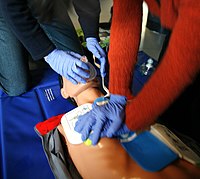
Photo from wikipedia
Main Text We congratulate Endo and co-authors on their retrospective registry-based analysis comparing closed-chest cardiopulmonary resuscitation (CCCPR) and open-chest cardiopulmonary resuscitation (OCCPR) in cardiac arrest patients following blunt trauma [1]… Click to show full abstract
Main Text We congratulate Endo and co-authors on their retrospective registry-based analysis comparing closed-chest cardiopulmonary resuscitation (CCCPR) and open-chest cardiopulmonary resuscitation (OCCPR) in cardiac arrest patients following blunt trauma [1] and would like to share the following comments. OCCPR is generally deemed futile in blunt trauma patients whenever cardiopulmonary resuscitation (CPR) is ongoing for more than 10 minutes without the patient showing any signs of life [2]. Among patients for whom OCCPR is recommended expected survival doubles whenever the patient is in profound shock compared to patients without vital signs [2]. The lack of information about CPR duration and circulatory status before OCCPR initiation jeopardizes the interpretation of the overall results as great heterogeneity might exist between the two propensityscore matched groups. It is potentially misleading to draw conclusions about efficacy of a treatment (OCCPR) whenever indications of the aforementioned treatment cannot be assessed. A further confounding element is that OCCPR is initiated in most of the cases for logistic reasons after initial treatment by CCCPR. During this initial window period a substantial proportion of potentially salvageable patients might achieve return over spontaneous circulation (ROSC) [3]. Early ROSC is associated with increased survival [4], and it precludes any further treatment by OCCPR. Therefore, patients from this registry treated through OCCPR should be considered as having an intrinsically worse prognosis at treatment initiation despite rigorous stratification and matching. The results would be more consistent if duration of CCCPR before OCCPR were known. This would allow exclusion from the analysis of cases where ROSC occurred before the average duration of CCCPR at OCCPR initiation. While acknowledging that the utilization of an instrumental variable (IV) might be used to control for unmeasurable confounders in non-randomized experiments, its choice should nevertheless respect the fundamental assumption that the IV is not directly associated with the outcome variable [5]. The IV “mean number of OCCPR cases per year in the hospital” captures hospital characteristics in a given year, which can be directly linked to survival as high-volume centers in terms of OCCPR are probably associated with increased resuscitation skills through this technique. This invalidates the use of the IV to measure OCCPR implementation. In our opinion OCCPR in blunt trauma cannot be rigorously associated with reduced rates of hospital discharge and of 24-h survival following Emergency Department admission based on the available evidence.
Journal Title: Critical Care
Year Published: 2017
Link to full text (if available)
Share on Social Media: Sign Up to like & get
recommendations!